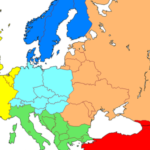A gateway to Europe, and a thriving investment destination in its own right, what should you know about setting up a business in Poland?
After emerging from the Soviet bloc in the early 1990s, Poland’s transition to market economy, and prominent member of the European business community, was swift. Now considered one of Central Europe’s financial success stories, Poland’s economic achievements continue to impress: in 2017, Poland’s GDP growth rate was estimated at 4.6%, with forecasts for 2018, set at a similarly impressive 4.2%.
Unsurprisingly, Poland’s sustained economic success has attracted entrepreneurs from across the industrial landscape, and the world. Like any popular destination however, getting the most out of Poland means getting to know the business environment, and becoming familiar with the logistical and administrative challenges that organisations face.
With that in mind, let’s take a look at some of the key considerations of Poland’s business set-up process…
Registration of a business in Poland
While business registration in Poland isn’t overly complicated, it’s no less important than any other major international destination. After you’ve decided on the legal structure your business will assume (LLC being the most common option for foreign investors), the subsequent registration process involves:
- Articles of Association: Prospective business in Poland must prepare Articles of Association before registration. These documents include information like business name, business activities, and minimum share capital (PLN 5,000 for an LLC).
- Premises: All businesses in Poland are required to have a registered office in the country.
- Polish Court Register: The most important step in Poland’s registration process is entry into the National Court Register – after which REGON (Statistical) and NIP (tax identification) numbers can be issued.
- Social Insurance: Businesses must identify themselves to the ZUS (Social Insurance Institution) in order to make social insurance payments.
- Bank Account: All businesses in Poland must have an in-country bank account
- VAT: Once entered onto the National Court Register, businesses must file an application to register as a VAT payer.
Government Support
Poland offers businesses setting up in the country a number of incentives drawn from domestic and EU sources – so it’s certainly worth exploring the options available to you. Specific initiatives include:
- Government grants: The Polish government has a grant programme in place for investments in specific sectors. Qualification for grants is based on factors such as job creation, business location, and investment expenditure.
- Special Economic Zones: Poland hosts 14 Special Economic Zones (SEZ), which offer eligible businesses tax incentives – ranging from 15-50%.
- Research & Development: To stimulate investment in the R&D sector, Poland offers businesses engaged in qualifying activities a range of grants and tax incentives.
Tax & Social Security
Income tax: Income tax in Poland is progressive, and charged at rates of 18% on earnings up to PLN 85,528, and 32% on earnings over that amount.
Social security: A range of is required in Poland, including pension, illness, disability, and unemployment benefits. Social security contributions are made by both employers and employees, and charged a variety of rates. Total contributions may range from 19.21% – 23.91%.
Foreign businesses unfamiliar with Poland’s tax legislation may wish to outsource their payroll to take advantage of pre-packaged compliance expertise – at least until they get up and running.
Recruitment & Mobilisation
Setting up in Poland will mean having to hire local employees, mobilise employees from their home location – or some combination of the two. Fortunately, Poland’s labour force is amongst the most skilled in Europe, with high levels of English proficiency and an abundance of expertise in science, IT and engineering fields.
On the other hand, businesses which need to mobilise employees to work in Poland during set-up and beyond should be aware of the country’s immigration regulations. Poland is an EU member-state, so employees from other EU states may come to work in the country with minimal restriction. Employees from outside the EU will, however, need to obtain a visa.
Poland is a developed and prosperous nation, which means living and working in the country shouldn’t be too daunting. Poland’s capital, Warsaw, is a metropolitan and multicultural urban centre with plenty of desirable residential areas, modern amenities and luxuries, and children’s education options.
Author Bio: Graham McKechnie
Graham McKechnie is activpayroll’s Global Tax Director. With 25 years’ professional experience, Graham works with employee populations all over the world to deliver insight and advice on a range of global mobility concerns, including immigration, employment law, income tax, social security and payroll. Graham had held positions in both the public and private sectors, with roles at HMRC, the Royal Bank of Scotland, PWC, and Deloitte.



Comments are closed.